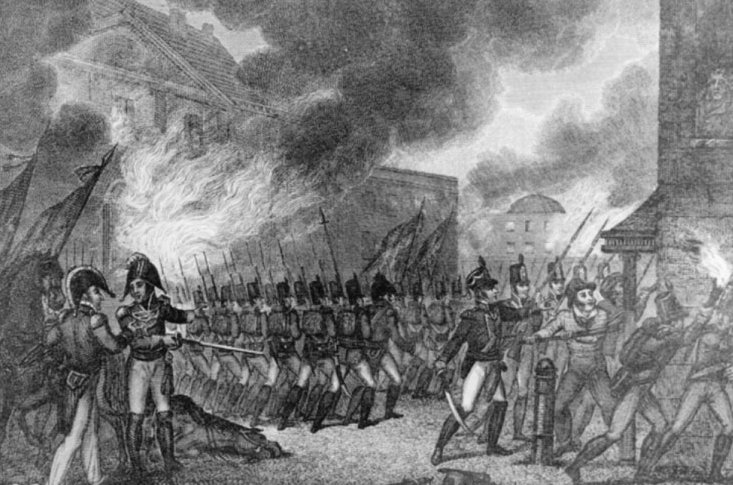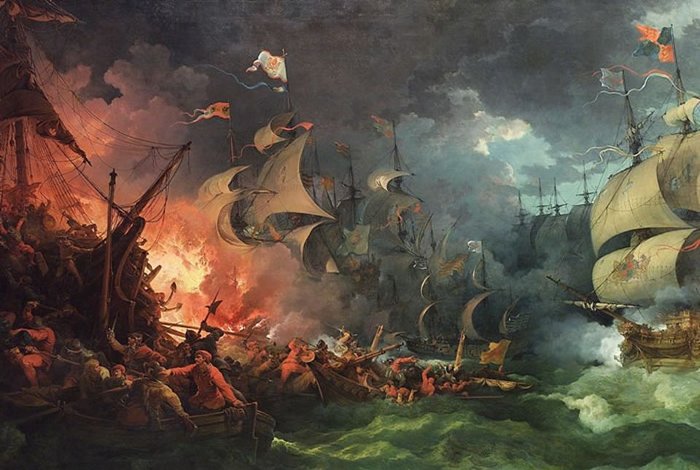Weather - The element of surprise decides the defeat of battle
Many battles in history gave unexpected results by the intervention of the weather.
War of 1812 between the United States and the British Empire
According to The Epoch Times, on August 25, 1,814, when the White House and the public building were burned by the British, the sky became pitch black and a downpour fell down to extinguish the fire. The most devastating typhoon swept across Washington DC and killed more British soldiers than any American fired gunfire, according to the US National Meteorological Agency.

The storm caused British troops to abandon their conquest in Washington DC, USA.(Photo: Wikimedia).
Tornadoes made the British fear to retreat to the country, but the storm also destroyed the city, especially the residential area. It was an unusual weather event in Washington DC Since then, 7 tornados have landed in the city, but this is the only tornado to kill.
The war against the British invaders of the British
King Philip II of Spain tried to conquer England in the 16th century. Abnormal strong storms struck the last attack on the Spanish fleet. The later storms were called "Good Wind" , only God favored the Protestant English more than Catholics in the battle.

The Spanish ship fleet collapsed before flooding into England.(Photo: Philip James de Loutherbourg).
The Spanish lacked strong military preparations for the United Kingdom, so the storms were not the only determinant of the outcome of the battle. But with other factors, they contribute to preventing the Spanish from invading England.
Conspiracy of Greek annexation of Persia
In 492 BC, Greece was almost overwhelmed by the powerful Persian army led by General Mardonius. But when the Persian army sailed to Athos, a storm destroyed 300 ships, killing 20,000 soldiers, according to historian Herodotus.

The storm especially led to the defeat of the Persian army when it invaded Greece.(Artwork: Wikimedia).
This event did not cause Persia to abandon its intention to invade Greece, the storm only prevented an attack. But this battle was probably the only chance of success for the Persian army because in the subsequent battles the Greeks continued to win.
From the perspective of the ancient Greeks, the storm was caused by the sea god Poseidon calling to protect them or the Persians who were too arrogant to be punished by the gods. The sea in this area is famous for strong storms. However, the time for this special storm to appear is very similar as it was originally arranged.
The Japanese invasion of the Mongol empire
Research by US scientists published on February 11, 2014 on the Proceedings of the Academy of Sciences shows that the weather always supports the invasion of the Mongol emperor.
The time of expansion of Thanh Cat Tu Han's land coincided with 15 years of the most humid and mild weather in the history of more than 1,100 years. The previous dry period may be the cause of the invasion. The high humidity stage creates fertile, perfect grasslands to raise horses and thus strengthens the Mongol army.

Portrait of Genghis Khan.(Photo: Wikimedia).
However, the weather against Genghis Khan's nephew was Kublai Khan when he tried to invade Japan on October 29, 1274."If not for the two major storms, Japan may be part of today's China," said Kerry Emanuel, a meteorologist at Massachusetts Institute of Technology (MIT), USA.
According to Emanuel, with small numbers and sketchy weapons, the Japanese were quickly cornered. But when night falls, the Korean navigator on the Mongolian ship feels a storm approaching. Earlier, the Japanese had hoped to delay the waiting time for reinforcements but instead, the sudden storm stormed out almost all Mongols, killing 13,000 people and completely extinguishing the intention. The village invaded Japan by Kublai Khan.
- The hidden culprit caused Napoleon to defeat at the Battle of Waterloo
- Confirm the existence of the 117th chemical element
- 6 most bloody battles in the history of world war
- 4 battles take place in the most severe weather in history
- The 6 most special battles of the Three Kingdoms, nearly 2000 years, have saved the history books (Part 1).
- The element has a half-life of 1 billion times the life of the universe
- Scientists can control the weather with lasers
- The chemical is dubbed 'the element of the devil'.
- Classic battles that change the history of the world
- The Element: Intel's latest weapon to modularize personal computers
- 4 new elements in the periodic table have been named by scientists
- The 28th essential element
 Is the magnetic North Pole shift dangerous to humanity?
Is the magnetic North Pole shift dangerous to humanity? Washington legalizes the recycling of human bodies into fertilizer
Washington legalizes the recycling of human bodies into fertilizer Lightning stone - the mysterious guest
Lightning stone - the mysterious guest Stunned by the mysterious sunset, strange appearance
Stunned by the mysterious sunset, strange appearance